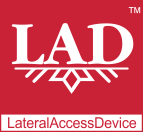
LateralAccessDevice
takes you back to before the Internet
How It Works | Download LAD | Support | LAD Security | Features & Uses | Resources | Members | User Guide
When Your Computer Becomes the Scammer's AccompliceComputers are useful tools, but they are dumb. Somehow computer technology has not yet evolved enough for computers to make judgement calls (of any sort). Whether a dinky low-powered laptop or a speedy, overclocked desktop, computers can only do what they are told. They do not second guess their instructions, nor conduct any sort of evaluation of their worth or benefit – they just do what they are told. The concern is who is doing the telling. In an ideal world that would only be you, however, that is not how today’s operating systems and computer programs work with their automatic updates, plug-ins and internet-ready accessibility. Far from it – unbeknownst to you an errant click on a website could surreptitiously download and install malware, spyware, viruses, trojans and ransomware. It's not just your computer or laptop that interests hackers. They can subvert gaming systems, entertainment consoles, security systems, TVs and appliances for their own purposes, the only requirement being that the gadget, electronic or appliance connects to the Internet and has some processing power (no matter how small). Several years ago it was reported that an Internet-capable refrigerator had taken part in a denial-of-service hack attack. That was only at the beginning of the proliferation of IoT devices and appliances, when an internet-connected fridge was still a novelty. Now such an event would hardly be considered newsworthy. Worse yet is the prospect of hackers and scammers getting not just access to, but control over your computer, conducting DoS attacks, hack attacks, scams and spam campaigns via your innocent-looking laptop and through your personally-assigned IP address. Should that computer be the computer you use for telecommuting, just a slightly savvy hacker could steal enough of your credentials and glean enough of your personal information to pretend to be you when contacting your business associates, again through your very own computer, to direct them to pay fake invoices, transfer money to shady bank accounts, purchase products or services or gain access to sensitive corporate data, all in your name and via your very own computer and IP address. When these scams, big or small, come to light, how do you explain what happened? How do you defend your trustworthiness and competence in the face of evidence pointing directly to you as the culprit, let alone defend yourself from potential personal liability and criminal charges? In addition to its many other features, LateralAccessDevice offers the added benefit of letting you record and store the packets that make up your computer’s communications. If something happens, you have a way of investigating what happened and defending yourself by showing that someone else hacked into your system to conduct their scams, not you. Digital evidence is certainly better than an “I don’t know.” In addition to providing evidence for after the fact, the recorded packets also provide you a way to proactively check if anyone is remotely accessing your computer and do something about it. With LateralAccessDevice you can act on the activities you find in the packet data by blocking off suspicious IP addresses trying to communicate with your computer and thwart the hacker’s scams before they get you in too deep. Trust is a big issue in any relationship, no less in business than in personal life. LateralAccessDevice gives you a way to maintain that trust, and even grow it through proven competence and dedication to the security and privacy of your business activities and work communications.
|